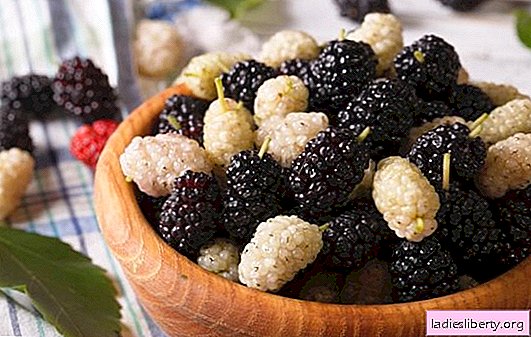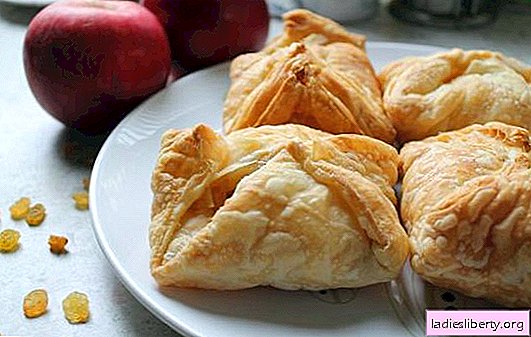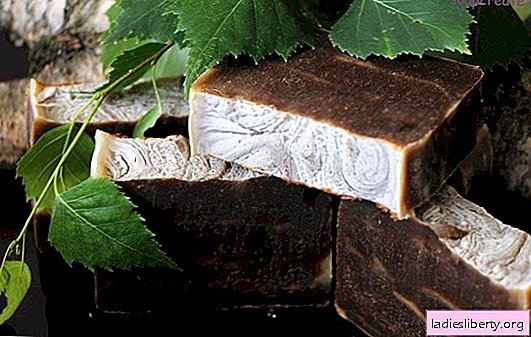
Mulberries are known to many for their excellent taste.
For some people who live in places where trees sprout, berries are not unusual or special.
But in the east, mulberry is extolled, believing that it is able to prolong life and restore poor eyesight.
Features of the composition of the mulberry and useful properties
In folk medicine, mulberry is highly regarded as a tree. For treatment at home, absolutely all parts of the plant are used: berries, buds, bark, leaves and even roots. This is explained by the large accumulation of vitamins, minerals and nutrients in mulberry, which are of great benefit to the body.
Mulberry nutritional value includes:
• water;
• proteins;
• carbohydrates;
• fats,
• alimentary fiber;
• ash;
• fiber;
• organic acids;
• monosaccharides and disaccharides.
Mulberry is a fairly low-calorie berry, 100 g of which contains 43 kcal.
The composition is rich in such substances:
vitamins A, C, K, group B (B1, B2, B4, B5, B9), which are contained in berries;
micro and macro elements, such as sodium, potassium, phosphorus, magnesium, calcium, manganese, zinc, selenium;
anthocyanins, antioxidants and polyphenols, which protect the body from the likelihood of developing diabetes, malignant tumors, diseases of neurology;
resveratol, which reduces the likelihood of a stroke and strengthens blood vessels;
lutein, alpha and beta-carotene, which, together with vitamins C, E and A, have a general strengthening effect on the body;
zeaxanthin - a substance that has a protective effect on the membranes of the eye during exposure to ultraviolet rays;
folic acid, which is very useful for pregnant women;
iron and copper, which interacting with vitamin K, have a positive effect on blood formation processes;
tannins, due to the fastening properties of which the berry is used for diarrhea. However, overripe fruits have the opposite laxative effect on the body;
pectins that improve digestion and reduce the level of fat and cholesterol in the body.
Compared to other berries, black mulberry contains much more phosphorus, potassium and calcium, which help the body to remain functional during mental stress.
Mulberry: beneficial properties of mulberry berries
The most attractive part of the mulberry tree is, of course, berries. In addition to the wonderful taste and the ability to satisfy thirst, berries have many useful properties:
1. Their juice is an excellent cold remedy. Regular use every three hours will help relieve symptoms of a cold, normalize body temperature and improve overall well-being.
2. Ripe fruits have a diuretic effect on the body. Ripe mulberry-based drinks relieve puffiness.
3. Having a positive effect on the processes of blood formation, they are recommended for anemia, as well as for heart diseases and predisposition to such.
4. A decoction of mulberry berries treats a sore throat when rinsing and eliminates the inflammatory processes and symptoms of diseases of the oral cavity.
5. Freshly squeezed juice from white mulberry fruit is an excellent prevention of rickets in children.
6. Mulberry is able to normalize the work of the reproductive system in both women and men. The mulberries help the male sex get rid of inflammation of the prostate, avoid impotence, and women during menopause remove unpleasant symptoms and minimize the risk of complications.
7. Berries are useful for people suffering from myocardial dystrophy, having heart defects. Regular consumption of berries relieves shortness of breath, normalizes heart rhythms, reduces the risk of developing pathologies, and prevents the development of cardiological diseases and atherosclerosis.
8. The beneficial properties of mulberries are also noticeable in the fight against stress, berries relieve fatigue, eliminate fatigue, nervous disorders, and fight insomnia. Great effectiveness is contained in the cooked broth based on berries and honey.
9. Freshly squeezed juice is useful for treating respiratory diseases. If there is a cough, mulberry-based products act as an expectorant and relieve inflammation. Constantly haunting unproductive coughs can also be cured with berry juice.
10. With fever, mulberry juice also helps, having an effect on the body's diaphoretic and antipyretic drugs.
11. Dry mulberry fruits when mixed with mint leaves have found their application as a treatment for hypertension.
12. Perhaps the external use of berries. Pulp is the main ingredient for making a hair mask, which helps strengthen hair follicles, restore damaged structure, accelerate hair growth and even fight dandruff.
Mulberry: beneficial properties of leaves, bark and roots
In addition to berries, the rest of the mulberry tree is also beneficial for the body. Only in pure or fresh form they are not consumed.
1. Mulberry bark has a wound-healing effect, so it is very often used as an ingredient in the ointment to quickly tighten scratches and other external injuries.
2. From the bark, you can prepare a decoction that treats a protracted cough.
3. A decoction of leaves is able to eliminate heat and lower body temperature. It is also used to treat diseases of the bronchi, lungs and sore throat, with the same decoction you can gargle a sore throat.
4. An infusion made from leaves lowers blood sugar and is recommended for diabetes.
5. Ointments, tinctures and decoctions of leaves are also effective for external use. They are suitable for the treatment of eczema, rheumatism, dermatitis and skin tuberculosis.
6. An infusion of mulberry roots effectively relieves pain in the stomach and intestines.
7. The infusion of the roots and bark is used in folk medicine by people with a disease such as asthma and inflammation of the respiratory tract.
Does mulberry have contraindications
Despite the many benefits to the body, there are mulberries and contraindications:
Mulberry berries are a potent potential allergen. People with individual intolerance or increased allergenic excitability should be careful about mulberry;
berries of the darkest shades (burgundy and dark violet) contain the largest amount of sugars, about 12%. Therefore, mulberry has contraindications for diabetics;
the abuse of berries will not bring more benefits to the body, but only provoke an upset digestive system and cause diarrhea;
Mulberry tree has a distinctive feature - to accumulate radioactive elements and harmful substances from the environment. Berries collected in a place with poor ecology can cause poor health;
after eating berries, you should refuse to drink cold water, this is fraught with consequences in the form of bloating and flatulence;
in large quantities, fresh fruits are contraindicated in hypertension.











